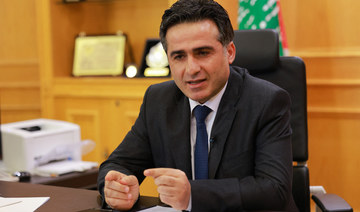BEIRUT: Lebanese Caretaker Prime Minister Najib Mikati on Monday praised Qatar’s contributions to helping Lebanon through its political and economic crises during a meeting with the Gulf state’s Assistant Foreign Minister for Regional Affairs Mohammed bin Abdulaziz bin Saleh Al-Khulaifi.
Mikati also highlighted the strong ties between the two states during talks with the visiting Qatari envoy.
Mikati thanked Qatar “once again for supporting the Lebanese army and enabling it to carry out its responsibilities,” according to his media office.
The Qatar official’s visit comes within the framework of the French-Arab-American endeavor to find solutions to the presidential vacuum in Lebanon, which has entered its sixth month as Parliament has held 11 failed voting sessions.
Meanwhile, the Free Patriotic Movement, the Lebanese Forces, the Lebanese Kataeb, and the Progressive Socialist Party are rejecting the candidate put forward by Hezbollah and its allies, MP Suleiman Frangieh.
In talks with Al-Khulaifi, Mikati discussed the situation in Lebanon and efforts by the caretaker government to tackle emergency cases as permitted by the constitution, his media office said.
He added that the solution to the crises affecting Lebanon lies in electing a president as soon as possible.
Al-Khulaifi also met Parliament Speaker Nabih Berri, caretaker Foreign Minister Abdallah Bou Habib, Grand Mufti Sheikh Abdul Latif Derian, Maronite Patriarch Bechara Boutros Al-Rahi and head of the Kataeb Party MP Sami Gemayel.
He later met Hussein Khalil, the political adviser to Hezbollah Secretary-General Hassan Nasrallah, in the presence of the head of Hezbollah’s Coordination and Liaison Unit, Wafiq Safa.
Following his meeting with Al-Khulaifi, Gemayel said the Qatari delegation was exploring views and trying to understand the reality of the situation in Lebanon.
“The delegation is putting itself at the disposal of Lebanon to help it and in full coordination with Saudi Arabia and the Gulf countries, and we expressed our openness and readiness to discuss our positions.”
Gemayel stressed that Qatar and Saudi Arabia will always stand by Lebanon and defend it against any undue foreign interference.
Al-Khulaifi represented Qatar in the five-party meeting held in Paris on Feb. 6 to discuss the Lebanese issue, which also included France, Saudi Arabia, Egypt and the US.
Doha had previously played a role in easing Lebanon’s previous crises, including in 2008, when the Doha agreement was reached between Lebanese political forces, ending an 18-month presidential vacuum.
The Lebanese opposition, made up mostly of Christian parties, is apprehensive about the guarantees that Hezbollah’s presidential candidate can provide and doubts that he can adhere to them against the backdrop of previous failures.
One political observer said: “Hezbollah and its political team had previously pledged in the Doha agreement not to topple the government, but it used the ‘blocking third’ in 2010 and deployed its members in Beirut, threatening in 2011 to impose Mikati as prime minister instead of the return of Saad Hariri at the time to head the government.”
The source added: “Hezbollah and its team agreed in the Doha agreement to dissociate themselves from the conflicts in the region in 2012, then retracted from that by involving Lebanon in the Syrian war, intervening in Yemen and launching campaigns against Saudi Arabia. Meanwhile, former President Michel Aoun — an ally of Hezbollah — turned into a protector of the party after he had pledged to adopt an independent approach.”
The Lady of the Mountain gathering, which opposes Hezbollah, said on Monday: “The presidential crisis is not a Christian one, but rather a reflection of a major national crisis represented by Hezbollah’s attempt to impose its will on the Lebanese when it comes to the presidency, and in the choices of the state as a whole, because Lebanon is under Iranian occupation.”
Lebanon is scheduled to hold municipal elections in May. Last year’s elections were postponed because they coincided with parliamentary elections.
Although Caretaker Interior Minister Bassam Mawlawi set the date of the elections for May on Monday, he said that holding them depends on whether the necessary funds can be secured.
“Part of the cost of holding the elections is covered by the UNDP, but there are costs that the state must secure, even if they have to be from the Special Drawing Rights — known as SDRs — of the International Monetary Fund,” Mawlawi said.

























